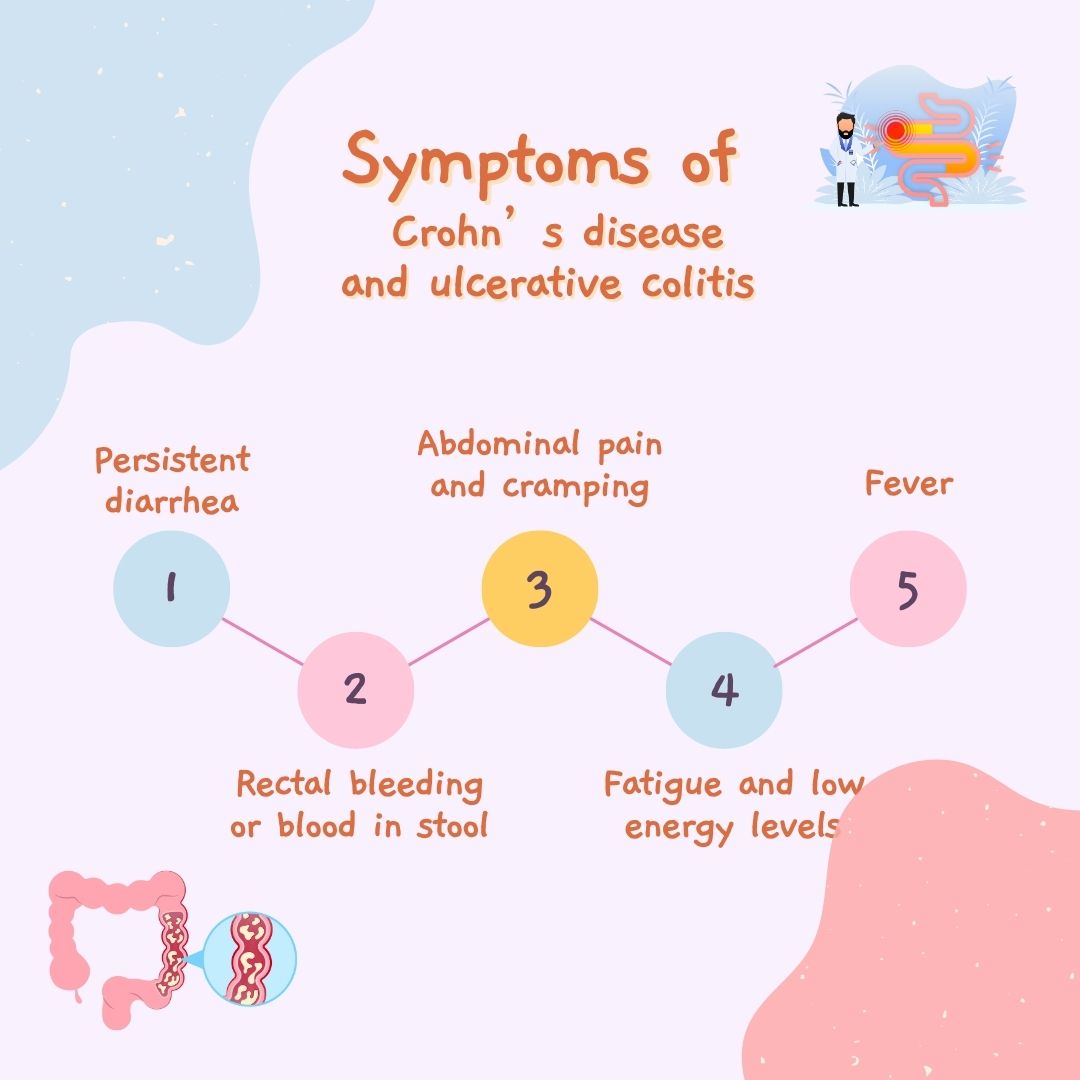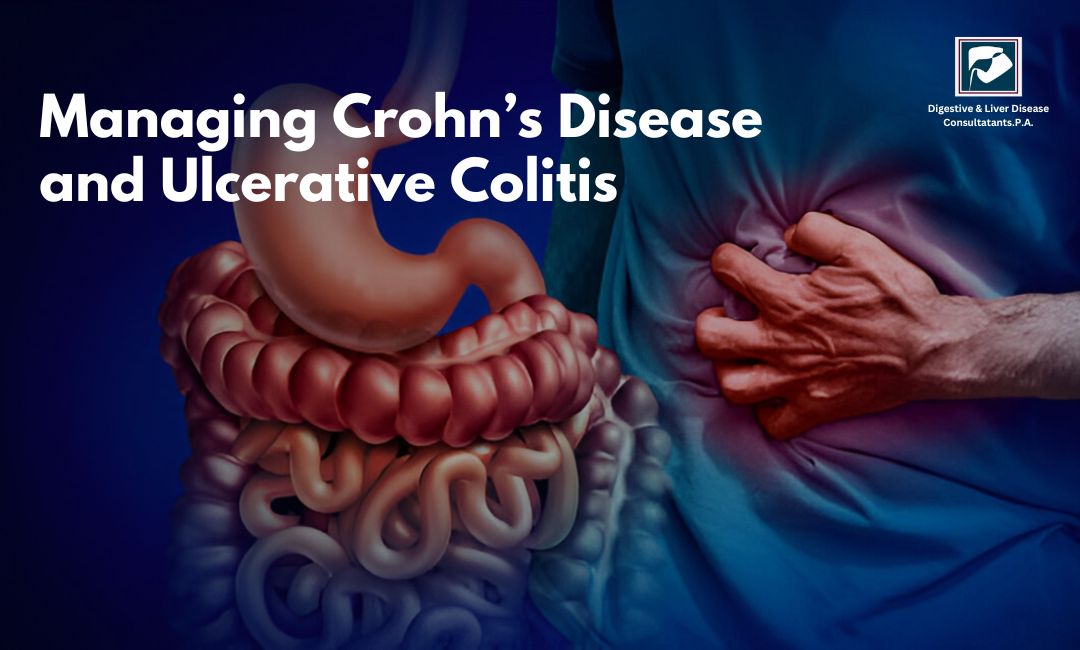Living with Crohn’s disease or ulcerative colitis can be challenging, but understanding these conditions and learning how to manage them effectively can make a world of difference. These chronic inflammatory bowel diseases (IBDs) affect millions of people worldwide, causing discomfort, lifestyle disruptions, and emotional stress. At Digestive & Liver Disease Consultants, P.A., we are committed to helping patients navigate the complexities of IBDs by providing personalized care, advanced treatments, and expert guidance. In this blog, we’ll explore what Crohn’s disease and ulcerative colitis are, their symptoms, treatment options, and tips for managing your condition so you can live life to the fullest.
What Are Crohn’s Disease and Ulcerative Colitis?
Crohn’s disease and ulcerative colitis are both types of inflammatory bowel diseases that cause inflammation in the digestive tract. While they share some similarities, there are key differences between the two:
Crohn’s Disease: This condition can affect any part of the gastrointestinal (GI) tract, from the mouth to the anus, though it most commonly impacts the small intestine and colon. The inflammation caused by Crohn’s often occurs in patches, leaving healthy tissue between affected areas. It can penetrate deep into the layers of the bowel wall.
Ulcerative Colitis: Unlike Crohn’s, ulcerative colitis is limited to the colon (large intestine) and rectum. The inflammation typically affects only the innermost lining of the colon and tends to be continuous rather than patchy.
Both conditions are autoimmune disorders, meaning the immune system mistakenly attacks healthy cells in the digestive tract. Although the exact cause of IBDs remains unknown, researchers believe genetics, environmental factors, and an overactive immune response play significant roles.

Recognizing the Symptoms
The symptoms of Crohn’s disease and ulcerative colitis can vary depending on the severity of inflammation and the location affected. However, common signs include:
- Persistent diarrhea
- Abdominal pain and cramping
- Rectal bleeding or blood in stool
- Fatigue and low energy levels
- Unintended weight loss
- Loss of appetite
- Fever
In addition to physical symptoms, many individuals with IBD experience mental health challenges such as anxiety and depression due to the unpredictable nature of the disease. If you notice any of these symptoms, it’s essential to consult a healthcare provider for proper diagnosis and treatment.
Treatment Options for IBDs
While there is currently no cure for Crohn’s disease or ulcerative colitis, various treatments can help control symptoms, reduce inflammation, and improve quality of life. The goal of treatment is to achieve remission—a period when symptoms subside—and maintain it for as long as possible. Here are some common approaches:
1. Medications
Anti-inflammatory drugs: These include corticosteroids and aminosalicylates, which help reduce inflammation.
Immunosuppressants: Medications like azathioprine and methotrexate suppress the immune system to prevent it from attacking the digestive tract.
Biologics: Advanced therapies such as anti-TNF agents (e.g., infliximab) target specific proteins involved in the inflammatory process.
Antibiotics: Used to treat infections or complications related to IBD.
2. Dietary Changes
Nutrition plays a crucial role in managing IBDs. Certain foods may trigger flare-ups, while others can promote healing and provide relief. Working with a registered dietitian can help tailor a meal plan to your needs. Some general dietary tips include:
- Avoiding high-fibre foods during flare-ups
- Limiting dairy if lactose intolerance is present
- Staying hydrated to prevent dehydration from diarrhea
- Eating smaller, more frequent meals instead of large ones
3. Surgery
When medications and lifestyle changes aren’t enough, surgery may be necessary. For Crohn’s disease, procedures might involve removing damaged portions of the intestine. In ulcerative colitis, a colectomy (removal of the colon) can eliminate the disease entirely since it only affects the colon.
4. Lifestyle Modifications
Stress management, regular exercise, and adequate sleep can significantly impact your overall well-being and help minimize flare-ups. Techniques like yoga, meditation, and deep breathing exercises can also be beneficial.
Tips for Managing Your Condition
Living with Crohn’s disease or ulcerative colitis requires ongoing effort and self-care. Here are some practical tips to help you stay on top of your health:
Keep Track of Your Symptoms
Maintaining a journal to record your symptoms, food intake, and activities can help identify patterns and triggers. Share this information with your doctor to refine your treatment plan.
Stay Informed
Educate yourself about your condition. Understanding how Crohn’s or ulcerative colitis affects your body empowers you to take charge of your health.
Build a Support System
Connect with others who understand what you’re going through. Support groups, whether online or in person, offer valuable advice and encouragement.
Prioritize Mental Health
Don’t hesitate to seek counselling or therapy if you’re struggling emotionally. Coping with a chronic illness can be tough, and professional support can make a big difference.
Follow Up Regularly
Schedule routine check-ups with your gastroenterologist to monitor your condition and adjust treatments as needed.
Why Choose Digestive & Liver Disease Consultants, P.A.?
At Digestive & Liver Disease Consultants, P.A., our team of experienced gastroenterologists specializes in diagnosing and treating a wide range of digestive disorders, including Crohn’s disease and ulcerative colitis. We understand that every patient is unique, which is why we create individualized treatment plans tailored to your specific needs. Our state-of-the-art facility offers cutting-edge diagnostic tools and therapeutic options, ensuring you receive the highest standard of care.
From initial consultation to long-term management, our compassionate staff is here to guide you every step of the way. Whether you need medication adjustments, nutritional counseling, or surgical intervention, we have the expertise to help you achieve optimal health outcomes.
Conclusion
Managing Crohn’s disease and ulcerative colitis may feel overwhelming at times, but remember—you don’t have to face it alone. With the right combination of medical care, lifestyle adjustments, and emotional support, it’s possible to lead a fulfilling life despite these conditions. By staying proactive and working closely with your healthcare team, you can minimize flare-ups and enjoy greater peace of mind.
If you’re struggling with symptoms of Crohn’s disease or ulcerative colitis, don’t wait to seek help. Contact Digestive & Liver Disease Consultants, P.A. today to schedule an appointment with one of our skilled Gastroenterologists.






